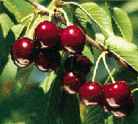 Bing -
Deep red/black fruits are one of the sweetest types.
Excellent for canning. Does not pollinate with
Napoleon. 700-800 hours of chill for best production.
Hardy to -10F (-23C); height: 15ft.
Bing -
Deep red/black fruits are one of the sweetest types.
Excellent for canning. Does not pollinate with
Napoleon. 700-800 hours of chill for best production.
Hardy to -10F (-23C); height: 15ft.
| HOME --> All Plants and Seeds INDEX --> Trees and Shrubs INDEX --> Cherry Trees and Seeds | |
| Plant and Seed Mobile Friendly Index |
Cherries are one of the prettiest spring trees
and one of the most popular fruits. Sour cherries are
self-pollinating (a single tree will bear fruit), but will not
pollinate sweet types. Sweet cherries tend to be
less cold hardy than their sour cousins. Most sweet types
are not self pollinating and must be interplanted with another
sweet variety to produce fruit.
Although fruiting cherries have
lovely spring blossoms, flowering cherries have been
grown to provide a more magnificent display. Some produce
fruits neglible in taste, while the fruits of others can be used
in jams and jellies. Cherries, like apples and some other
fruits, need a certain number for 'chill hours" (number of hours
they spend below freezing temperatures) to produce
well. This can be anywhere from 300 to 1200 hours long,
making varieties with a lower chill requirement more suitable for
warmer climates. See GROWING HINTS below for
inofrmation on how to grow these valuable trees.
Dwarf? Semi-dwarf? Standard?
Most modern cherries are grafted onto vigorous rootstocks and are
available in 3 sizes:
Dwarf trees begin producing in 2-3 years. At maturity, they
reach between 6-8ft. in height, which makes them perfect for the
smaller garden.
Semi-dwarf trees grow to an average height of 12-15ft. at maturity and begin to bear fruit in 3-5 years.
Standard trees reach 20-25ft. in height and begin to bear in
about 5-6 years. .
Rich's Cherries
Our fruiting cherry trees are sturdy specimens with a trunk diameter of 1/2 to 5/8 inch. Most varieties are available as standards or semi-dwarf, as indicated. Available sizes for flowering varieties are as indicated, but other sizes than those listed are often available. With proper care, our cherries will give you years of beauty and fruit.
| #P919SD Semi-dwarf tree $56.95 |
|
| #P2-919SD Two Semi-dwarf trees for $80.00 |
|
| #P919S Standard tree $56.95 |
|
| #P2-919S Two Standard trees for $80.00 |
|
SWEET TYPES
 Bing -
Deep red/black fruits are one of the sweetest types.
Excellent for canning. Does not pollinate with
Napoleon. 700-800 hours of chill for best production.
Hardy to -10F (-23C); height: 15ft.
Bing -
Deep red/black fruits are one of the sweetest types.
Excellent for canning. Does not pollinate with
Napoleon. 700-800 hours of chill for best production.
Hardy to -10F (-23C); height: 15ft.
| #P920SD Semi-dwarf tree $56.95 |
|
| #P2-920SD Two Semi-dwarf trees for $80.00 |
|
| #P920S Standard tree $56.95 |
|
| #P2-920S Two Standard trees $80.00 |
|
Mazzard Cherry (Prunus avium) - Sweet
cherry used most often as rootstock for other
varieties. Produces a quality red fruit. Hardy to -40F
(-40C); height: 50 ft.
| #2197 seed packet; approximately 50 seeds $ 10.00 |
|
| #B12197 bulk seeds 1 lb. ; approximately 2,000 seeds $90.00 |
|
| See "Rootstock" for seedlings |
|
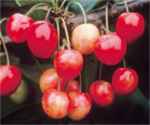 Napoleon
(Royal Ann) - Sweet variety producing large yellow fruit
with a pink blush. Good for canning. Will not
pollinate with Bing. 500 chill hours required for best
production. Hardy to -10F (-23C); height: 15ft.
Napoleon
(Royal Ann) - Sweet variety producing large yellow fruit
with a pink blush. Good for canning. Will not
pollinate with Bing. 500 chill hours required for best
production. Hardy to -10F (-23C); height: 15ft.
| #P921SD Semi-dwarf tree $56.95 |
|
| #P2-921SD Two Semi-dwarf trees for $80.00 |
|
| #P921S Standard tree $56.95 |
|
| #P2-921S Two Standard trees for $80.00 |
|
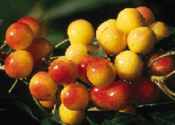 Ranier
- Pretty yellow cherries with a red blush.
Fruits are large and in great numbers.500 hours chill.
Ranier
- Pretty yellow cherries with a red blush.
Fruits are large and in great numbers.500 hours chill.
| #P2659SD Semi-dwarf tree $56.95 |
|
| #P2-2659SD Two Semi-dwarf trees for $80.00 |
|
| #P2659S Standard tree $56.95 |
|
| #P2-2659S Two Standard trees for $80.00 |
|
Lambert - Dark red heart shaped fruits, slightly
smaller and ripening a week later than Bing. Will not
pollinate Napoleon or Bin. 800 chill hours required for best
crops. Hardy to -30 (-34.4C)
| #P2660SD Semi-dwarf tree $56.95 |
|
| #P2-2660SD Two Semi-dwarf trees for $80.00 |
|
| #P2660S Standard tree $56.95 |
|
| #P2-2660S Two Standard trees for $80.00 |
|
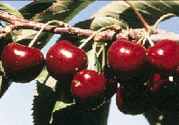 Lapins
- Self-pollinating type with firm dark red sweet fruits. Very
productive. Good pollinator for other varieties.
Requires 300-450 chill hours for best crops. Hardy to -10F
(-23C); height: 15ft.
Lapins
- Self-pollinating type with firm dark red sweet fruits. Very
productive. Good pollinator for other varieties.
Requires 300-450 chill hours for best crops. Hardy to -10F
(-23C); height: 15ft.
| #P923SD Semi-dwarf tree $56.95 |
|
| #P2-923SD Two Semi-dwarf trees for $80.00 |
|
| #P923S Standard tree $56.95 |
|
| #P2-923S Two Standard trees for $80.00 |
|
| See "Rootstock" for seeds and
seedlings |
|
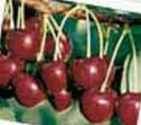 Selah
(also known as Liberty Bell) Large firm red cherry
with a slightly earlier ripening than Lapins. Good
pollinator for all varieties (including Bing). 700 chill hours
required for best production. Hardy to -10F (-23C);
height 15ft.
Selah
(also known as Liberty Bell) Large firm red cherry
with a slightly earlier ripening than Lapins. Good
pollinator for all varieties (including Bing). 700 chill hours
required for best production. Hardy to -10F (-23C);
height 15ft.
| #P4277SD Semi-dwarf tree $56.95 |
|
| #P2-4277SD Two Semi-dwarf trees for $80.00 |
|
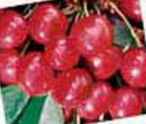 Sweetheart
- This Van - Newstar cross has bright red
medium sized fruits with a good sweet flavor. Ripens between
July 25 and August 1st. Requires pruning to prevent
over-cropping. Self fertile annual bearer. 1000 chill
hours. Hardy to -20F (-28.8C)
Sweetheart
- This Van - Newstar cross has bright red
medium sized fruits with a good sweet flavor. Ripens between
July 25 and August 1st. Requires pruning to prevent
over-cropping. Self fertile annual bearer. 1000 chill
hours. Hardy to -20F (-28.8C)
| #P1428S Standard tree $56.95 |
|
| #P2-1428S Two Standard trees for $80.00 |
|
Ulster - A Schmidt's - Lambert
that resembles Schmidt's but is more productive. The fruit is dark
red, large, and firm fleshed, like Schmidt's, but is more
resistant to cracking. 800 chill hours. Ripens mid
July.
| #P2636S Standard tree $56.95 |
|
| #P2-2636S Two Standard trees for $80.00 |
|
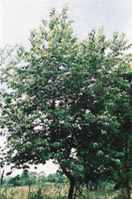 Black
Cherry (Wild Cherry, Rum Cherry)
Prunus serotina - Growing wild along fencerows in
the US and parts of Canada, this species produces pretty white
blooms in the spring followed by small edible cherries that have
been used for centuries to make jams, jellies and pies. They
were also used by American Indian tribes as a medicinal
herb, being used to treat a number of complaints, including
stomache disroders and sore throats (thus Wild Cherry cough
drops). The wood is prized to maked furniture and other
objects . Hardy to -40F (-40C); height: 25ft.
Black
Cherry (Wild Cherry, Rum Cherry)
Prunus serotina - Growing wild along fencerows in
the US and parts of Canada, this species produces pretty white
blooms in the spring followed by small edible cherries that have
been used for centuries to make jams, jellies and pies. They
were also used by American Indian tribes as a medicinal
herb, being used to treat a number of complaints, including
stomache disroders and sore throats (thus Wild Cherry cough
drops). The wood is prized to maked furniture and other
objects . Hardy to -40F (-40C); height: 25ft.
| #2220 Packet $5.50 Approximately 50 seeds |
|
| #B12220 Bulk seeds $39.95 1 lb. seeds |
|
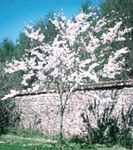 Higan
Weeping Cherry (Prunus subhirtella pendula)
Single pink blossoms on slender weeping branches. Good
landscape or specimen tree. Hardy to -30F (-35C); height:
15ft.
Higan
Weeping Cherry (Prunus subhirtella pendula)
Single pink blossoms on slender weeping branches. Good
landscape or specimen tree. Hardy to -30F (-35C); height:
15ft.
| #1484 Seed packet; Approximately 50 seeds $ 25.50 |
|
| #B11484 1 lb. seeds approximately 4,900 seeds $ 345.00 |
|
| #P1484H 2-3ft. tree $ 34.95 |
|
| #P4-1484H (2-3ft. trees) Four trees for $ 50.95 |
|
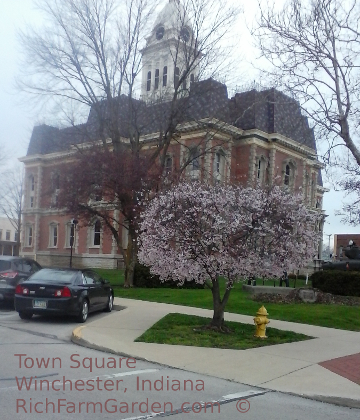 Kwanzan
- (Prunus serrulata 'Kwanzan') The most
popular of the ornamental cherries, with deep pink
2-1/2in. double blooms. New growth is reddish-copper turning
to green. Hardy to -10F (-23.3C); height: 18ft.
Kwanzan
- (Prunus serrulata 'Kwanzan') The most
popular of the ornamental cherries, with deep pink
2-1/2in. double blooms. New growth is reddish-copper turning
to green. Hardy to -10F (-23.3C); height: 18ft.
| #P1028H 2-3ft. tree $56.95 |
|
| #P3-1028H (2-3ft. trees) Three trees for $50.95 |
|
Japanese Flower Cherry - (Prunus serrulata)
- 樱花 Red leaves Cherry - Ornamental. Hardy to -10F
(-23.3C); height: 18ft.
| #0222144 Seed packet approximately 50 seeds $ 15.50 |
|
| #B4z-0222144 4 oz. seeds (approximately 1,200 seeds) $ 56.90 |
|
| #B1-10222144 Bulk seed 1 lb. seeds $ 93.90 |
|
Nanking (Prunus tomentosa) Hardy
attractive ornamental tree with white blossoms.
The fruits can be used to make jellies and jams. Hardy to
-50F (-45C); height: 10ft.
| #1485 Seed packet approximately 50 seeds $ 5.50 |
|
| #B4z1485 4 oz. seeds approximately 1,200 seeds $ 33.95 |
|
| #P1485H 12 - 18 inch tree $ 34.95 |
|
| #P5-1485H (12 - 18 inch seedlings) Five trees for $50.95 |
|
Okame (Prunus x Okame)
Upright vase shaped with rich pink blooms appearing before the
leaves. Bronze-red autumn foliage. Good heat and cold
tolerance. Hardy to -30F (-34.4C); height: 15ft.
| #P2663H 2-3ft. tree $24.95 |
|
| #P3-2663H (2-3ft. trees) Three trees for $33.99 |
|
Purpleleaf Sand Cherry (Prunus x cistena)
- Native American shrub or small tree with bright
red/purple foliage and fragrant pink blooms that open after leaves
appear. Hardy and vigorous grower. Hardy to -50F
(-45C); height: 7 - 10 ft.
| #2664H 1 yr. seedling $ 24.95 |
|
| #P3-2664H (1 yr. seedlings) Three trees for $33.99 |
|
Western Sand Cherry (Prunus besseyi) - Flowering
cherry with a wide spreading habit. Blooms are pink and
very fragrant. Hardy and vigorous grower. Hardy to -40F
(-40C); height: 6ft.
| See Rootstock for seeds and
seedlings |
|
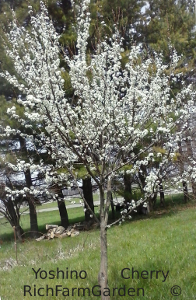 Yoshino
(Prunus x yedoensis) These are the
beautiful white blooming cherries planted in Washington
D.C.'s Tidal Basin. Rounded growth habit and
pretty yellow fall foliage make this a good choice for specimen
planting.
Yoshino
(Prunus x yedoensis) These are the
beautiful white blooming cherries planted in Washington
D.C.'s Tidal Basin. Rounded growth habit and
pretty yellow fall foliage make this a good choice for specimen
planting.
| #P1097H 2-3ft. tree $ 24.95 |
|
| #P3-1097H (2-3ft. trees) Three trees for $ 33.99 |
|
| #1097 Seed Packet ; approximately 150 seeds $ 79.50 |
|
| GROWING HINTS: Cherries do well in a wide range of soil types, but for best results, plant on a slope higher than surrounding ground to avoid late frosts. Trees should be planted approximately 25 - 30ft apart each way. Soil should be well drained clay loam or sand loam. Cherries can be propagated by seeds, cuttings or grafts. Many excellent rootstocks can be found Here for use in grafting cherries. Trees should be planted in spring in colder areas, but fall or spring will do fine for warmer climates.. Trees should be pruned in late winter or very early spring as needed. A modified leader system works best and wide angled branches should be chosen as leaders (narrow angled branches are prone to breakage and can damage the tree). Protect fruit from bird damage by covering the tree with netting. Scare deivices are available, but birds become used to them eventually. |
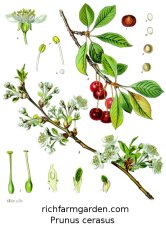 |
ORDER EARLY!
See TERMS
Back to
VARIETY INDEX Terms
HOME
![]() If you have
arrived in someone else's frame, or can not see all of the other
information available on richfarmgarden.com Click on logo to enter
from beginning
If you have
arrived in someone else's frame, or can not see all of the other
information available on richfarmgarden.com Click on logo to enter
from beginning